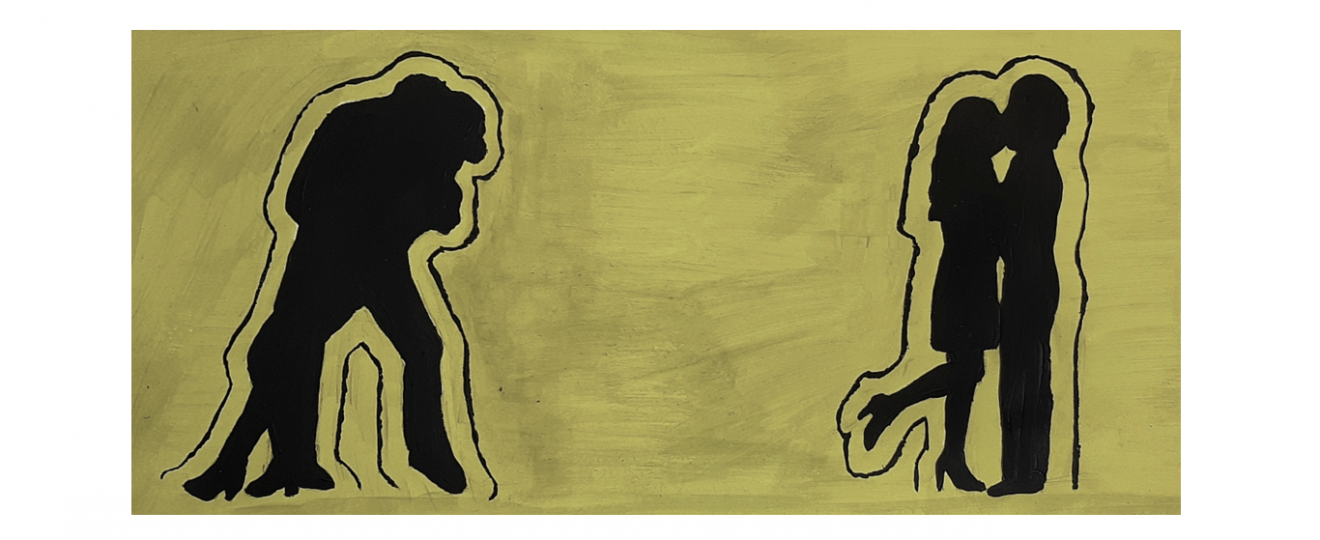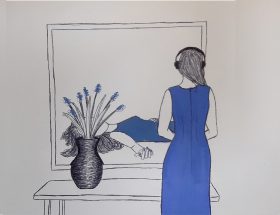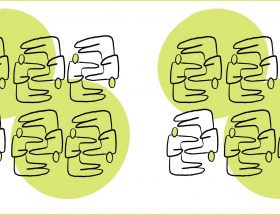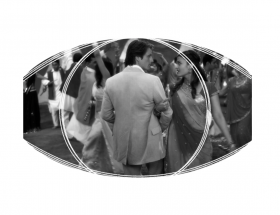I don’t know how to love.
Scratch that.
I think I don’t know how to love.
And actually, scratch that again.
Because love isn’t the right word.
I love my friends and my family deeply. I hold them nervously inside my heart, like they’re perched upon some fleshy cushion that’s tucked away within a dense and brambly thicket.
I love my projects. Big passions, dreams that could never happen, goals that could. I’m enamored with experiences (new ones or the tried and true), one brush of lime plaster in my individualised fresco. The big moments that feel significant. Checkpoints, proud and tall like a gilded statue. The small and frequent ones; laughter-filled and contentment dotted coffee dates, walks through a park in autumn. I adore learning, despite the fact that being in Uni sometimes feels like swimming just below water, with weights around my ankles just heavy enough that I can’t break the surface. And even the little hobbies, like running or reading or cooking or learning to knit, I feel my ribcage grinning every time I partake in them.
Every now and again I feel so full of love that, like the Grinch, my heart swells in my chest so large that my breath tightens and my eyes widen, and I’m filled with some blooming orchestral flowers. It’s always unexpected. I feel the tides of love roll in when I watch someone I adore laughing, when it’s a beautiful morning, when I miss my siblings, when I hear a particularly good song, when I’m up early and have drank my coffee and put on nice earrings and have gotten a decent amount of work done before 10.30, when I feel wholly and utterly full, like my life and the life I am supposed to live have overlapped for just this one moment, the harmonious click being so overwhelming I can do nothing but marvel at it.
But in spite of all the love I contain in my heart, sometimes I feel as though some piece of me is missing the ability to be in love. Mainly because, I never have been.
Sex has never been something that scared me.
I know many people who, growing up, felt unending anxieties surrounding sex. What would their ‘first time’ be like? Who would it be with? Where would it be? How would it feel? Would they be any good at it? And while these had appeared in my head as mere questions, I didn’t actually spend too much time theorising or romanticising or fantasizing because ultimately, what happens, happens. Right?
My mother and father had a very casual approach to discussing sex with their children. Their respective Western and Northern European views meant that they were always very honest, very calm: there wasn’t any taboo surrounding the subject. When I was young and asked how babies were made, I received a scientific and accurate description. When I had my first sex education class I talked about it in the car ride home from school. I was always allowed to watch movies with sex scenes in them because, as my mother said, ‘how does it make sense that kids in America can watch movies where people are shot, but it’s somehow horrific for them to see someone naked?’.
She had a point.
Essentially, as long as we were being respectful and mature, sex was something we were allowed to know about or talk about. It was natural and normal.
Then came high school.
As I’ve mentioned in articles before, I went to a Catholic high school (it’s a personality trait at this point). And while I am very thankful for my time there, it was something of a culture shock. Until my first week, I had never been to a mass – I had never even properly attended a religious ceremony of any kind. This was because my family and I were definitively agnostic, bordering on atheist. But suddenly there I was, sitting in Theology class four days a week, either learning about the bible itself and various tenets of it (interesting), or listening to the demonisation of birth control and the belief that homosexuality must be derived from a bad relationship with your parent of the same sex.
On and on it went. Rhetoric I couldn’t stand flooded the classroom and banged its dogmatic fists against my closed ears. Rhetoric that antagonised men and patronised women. Rhetoric that I often tried to debate, until I realised that no matter how many times I raised my chubby hand to argue, the Catholic church was a bit more convincing to most than I, and ultimately, I was the one who chose to go to this school. I decided to just be silent.
The sex I heard about in high school was not the same sex I had heard about growing up. Here, sex was sacred enough to be scary, a looming shadowy monster that writhed into your bones, tempting you into a life of sadness and STDs, and then shaming you for it afterwards.
Until you were married, of course. Then, sex was golden sunlight on clean sheets. Sweet bouquets of lilies and primrose. Soft skin and baby powder. Structured and supple. Safe. Saintly.
By third year Theology, like most people, I wrote down what would be on the quiz, daydreamed, and tried hard not to internalise anything being said. In that class, I sat next to one of my closest friends, Lili. Lili was, like me, very disillusioned with all we learned about. As a result, we spent most of our Theology A Block together making jokes, splitting caffeine pills, and passing paper back and forth where we wrote criticisms of whatever the teacher, Sister Edith, had just lectured.
One day, Sister took 12 pieces of red construction paper shaped like hearts from the half-jammed drawer in her desk. She handed them around to all the students in the class. I looked down at the little shape in my hands, its delicate edges, how sweetly and cautiously it had been cut and crafted, how round the top of it was, how perfect the point.
“Now crumple them up,” she said.
Unsure, we all looked at her, blinking dumbly like cows.
“Go ahead.” she nodded.
Slowly, I felt my hands crush its smooth and flat face, crinkling its once perfect red horizon into folds and corners of disarray. Softly smashing surface against surface, then sat silently as other hands crumpled and cracked and folded and spun.
The cacophony of destruction soon settled, and every teenage fist in the room was holding a canyoned and wrinkled ball, like strange papier-mâché apples.
“Now smooth it out” Sister Edith said, a witty smile spread across her face, the glee at our confusion dancing on her teeth.
Slowly, everyone pushed their paper flat. Palms, fists, fingertips, all massaging the table, until our red hearts were once again hearts, but this time, they were rippled and damaged, like the currents under a bloody ocean coming to break.
Sister gazed around the room, eyes twinkling at every crack, fold, and rip that we had all been unable to undo. She lifted her look to all of us, and conclusively pronounced:
“This is what happens to a woman’s heart when she has sex outside of marriage.”
When I was 19 I went on a date with a 27 year old. He was cute. And very tall. And dressed well.
At this time in my life, I was feeling behind everyone else, and worried that my general reluctance to take chances romantically was part of the reason why. I, after all, wanted to feel my age. To be something fun and young, to go on a date with romance in mind simply because I can.
So when the opportunity presented itself at 8pm on a Wednesday, I told myself that experiences shape character, and it was good to go outside of my comfort zone.
The date started normally enough. Casual, colloquial, I even ignored the first few comments that made me cringe in order to give him the benefit of the doubt. But, when 20 minutes in, he held my hand as we walked through the tiny and judgemental university town, I felt light, red-flag shaped droplets of sweat encroach upon my forehead. When he stroked the scar on my knee and said “I already have our second date planned” I suddenly felt like someone had chained me to a boulder, and was rocking me back and forth over the edge of a dock. And then when he, in front of a huge crowd, whispered “I’m going to kiss you now” and shoved his strange tongue into my mouth, I punched the ABORT MISSION button in my head.
The date was a whopping 45 minutes.
At home, I screamed at my flatmate in some comic mixture of disgust and fear.
“Is something wrong with me or with him?! What the hell was that!?”
We laughed and I screamed some more and I went to work and I came home and we laughed again.
However at night, I did wonder if someone other than me would have thought that he was not weird, but in fact, wonderfully romantic. That he was braver than I, honest about who he was, what he wanted, who he wanted. Someone else, someone softer, someone functional, they would have seen it.
I slept as an awkwardly shaped idea sat in my mouth like one of the pebbles of Demosthenes. The idea that this was yet another opportunity I ran away from. That maybe, what I had said earlier that day actually held a fundamental truth I hadn’t seen.
Something is wrong with him, AND something was wrong with me.
I don’t know if it was the influence of my parents’ relationship, or if it’s just who we are intrinsically, but my sister and I are not very lovey-dovey people. Recently, we were sitting eating lunch together and talking about our favourite childhood films, when we realised that as children growing up and consuming media, our shared concept of what an ‘ideal’ relationship looked like was…. Interesting.
It wasn’t sweet or kind or soft or understanding.
We both adored the movie and TV love stories that consisted of two utterly stubborn and hard-headed people, neverending banter containing a plethora of almost-hurtful roasts, and hostile disagreements that tumbled over one another again and again in an eternal yet sexy power struggle. When, in Sinbad: Legend of the Seven Seas, Marina throws a bucket of slime at Sinbad’s head, and he throws mud back at her, we both sat starry-eyed hoping one day to throw a bucket at someone ourselves.
I don’t think I have to explain why this dynamic could be a dangerous one to internalise as the pinnacle of romance. The innate violence it perpetuates, both verbal and physical (Re: the bucket), the strange performances of masculinity, the rejection and shaming of classical femininity, the undermining of the other person, the animosity building through unhealthy forms of conflict, the often blatant sexism, the general toxicity. None of this (when I put on my healthy thinking cap), is what I would genuinely call an ‘ideal’ relationship. In fact, it seems almost dangerous. And yet, it’s the only one I can stand. Even though I see why every character (literally every single one) Harrison Ford played in his heyday was problematic with a capital P, I’m still girlishly in love with them.
When I’ve been in a romantic setting and someone has called me beautiful, or has had a certain look in their eyes, or a certain tone in their voice, or someone offers me their coat on a cold night, the banality of it all and the luridly cliche nature of it makes every piece of me cringe and convulse. Is that bitter? People have told me that it will be different once I’m actually in love with someone. They fail to tell me how you’re supposed to do the actual act of falling in love then, if none of the sweet stuff that builds the feeling works on you. But alright!
I’m sure there are a myriad of explanations for why I seem to reject the overall kindness of romance, and yet I can’t help but wonder if Harrison Ford’s sexy brusqueness is part of the reason why.
I’m not aromantic, as it were. But sometimes I do feel as though something places me aside from many of my peers. At age twenty I’ve never had a relationship that would generate the terms ‘boyfriend’ or ‘girlfriend’ for appropriate usage. I’ve had what I like to clumsily call ‘things’. While many of you may read that and scoff (twenty is remarkably young still, I know), what’s more, is that any form of romance in my life is scarce. I have no crushes, and with the exception of my occasional tendency to fall in “love” with attractive or interesting strangers (in those brilliant and imaginative seconds while we pass one another on the street, while they tap their foot waiting for the bus, while they leaf through a book in my favourite park), my life is romantically void.
I’m not anti-love. In fact, in my own little ways, I’m something of a romantic. I don’t want to be doted on or showered in adoration. I hate PDA. I don’t believe in ‘true love’ or ‘the one’. But I think that love is, in and of itself, beautiful. Worthy of sharing and re-telling and laud.
I love TV romances, flowery poetry, Klimt’s The Kiss, songs about yearning and aching, Kurt Russel and Goldie Hawn, novel romance subplots, older couples eating dinner in silence. I like seeing my friends giddy over someone they’ve met, the charged eye contact you make with someone cool in the same store, colloquial flirting with the barista who gave me my coffee free that one time.
And yet, in my actual life? Nothing.
I hope no one reads this and thinks that this is a fact that makes me sad. It doesn’t. Not really.
The effect it has on me is actually two-fold.
On one hand, I feel confusion. Why is it that I both reject and oftentimes repel romance? I used to explain it away by using my independence as reasoning. I’m just very busy, I would think. I don’t mind being alone, I’m not very classically affectionate. When I was younger and less sure of myself, I decided it was because I wasn’t attractive or ‘desirable’ enough, and then that transformed into me understanding that maybe I’m a little bit cold, a little bit harsh, and perhaps even judgemental in a way that does not lend itself well to being the romantic subject of other people’s eye.
On the other hand, I feel rising panic at how my lack of romance makes others perceive me. I often think about certain friends I’ve gotten coffee with, friends who ask me about my love life and nod in patronising sorrow when I say what I’ve always said (It’s nonexistent). I suffer under the barrage of “why don’t you just go for it?”, and “you need to be more open!” with a brave, if not irritated, face. But under the pained smile and hollow laughs, I can feel the defence wall I have built from self-understanding and assurance, eroding. Eventually, something that didn’t bother me too much (being alone) becomes something of a stigma, and the thing I don’t have (a partner) becomes a flaunt steeped in social currency. My being perpetually and forever single makes me wrong, or strange, or less than, or probably damaged (because why will no one date this girl?).
Do not get me wrong. I know I am not alone in this. But to find the others who feel this way is tough.
It is hard to bring all of this up without seeming like you’re actually some affection-starved and lonely spinster, spending days and nights praying that some story-book character will swoop in and secure your status and self-image by devoting themselves solely to you. It is hard enough to write about this without seeming that way.
The truth is, being a woman without love, who isn’t craving it, but who feels twinges of strangeness surrounding the fact that they don’t have it, all seems like a big charade to other people.
“I don’t really see this going anywhere.”
I heard myself say the words and felt immediately guilty. I know I have every right to be uninterested in someone. But I’m empathetic and I can see the look on his face and can see his shoulders slouch and see the air puff out from his chest.
“Oh.” He says.
I look at the floor with wide eyes. Oh? What am I supposed to do with an Oh? I breathe in.
“Yeah.” It’s all I can say. How creative!
I step away and leave. His face is crumpled in disappointment and something like anger. Maybe mostly sadness.
As I walk down the knowing streets that morning, I furrow my brow into a protective scowl. Now I can look as sour as I feel.
Weeks later I heard that he told his friends about me. Once, excitedly. Another time, disappointedly. “He’s just a big romantic”, his friend had told mine when they saw each other in town later, “he was expecting something more. Probably a relationship or something.”
I’d see him on the street and avoid eye contact. He looked at me with downtrodden eyes.
In moments of introspectivity, I found myself thinking back to Sister Edith’s paper heart demonstration.
“This is what happens to a woman’s heart when she has sex outside of marriage.”
“Bullshit” Lili and I had whispered to one another at the same time. When Sister asked for our thoughts, I broke my years of silence and raised a hand briskly. I self-righteously lectured to her about how I found the narrative she was constructing deplorable. It was irresponsible to teach children that women were some fragile and petal-soft does, running away from hormone hypnotised and raging wolven men, when it could easily be the other way around. Or neither. Lili liked it. The rest of the class probably wanted me to be quiet as it was only 8.27am.
“This is what happens to a woman’s heart when she has sex outside of marriage.”
Was this Catholic guilt? Did I have Catholic Guilt?! Seriously? Did four years of Catholic school qualify me as someone who might be haunted by various wagging nun fingers?
“This is what happens to a woman’s heart when she has sex outside of marriage.”
My heart wasn’t crumpled. I was in fact, not fragile, nor petal-soft. I was fine. Happy, even.
I was in A Block Theology in Northern California. Crumpling up a paper heart that wasn’t mine, then trying to smooth it out, and set it on its way.
Throughout my life, romance has been a sphere of myself with which I have struggled to understand. I feel like a very large walking and talking contradiction.
I am happy with who I am. I am also unhappy that maybe other people aren’t happy with who I am. More realistically, I know that no one cares.
What frustrates me about writing this article is that I have no real argument or moral to end it with.
The point of writing, I suppose, is to sort things out for yourself. To make sense of what you’re tangled within.
I am, evidently, still tangled.
Art by Kate Grant




